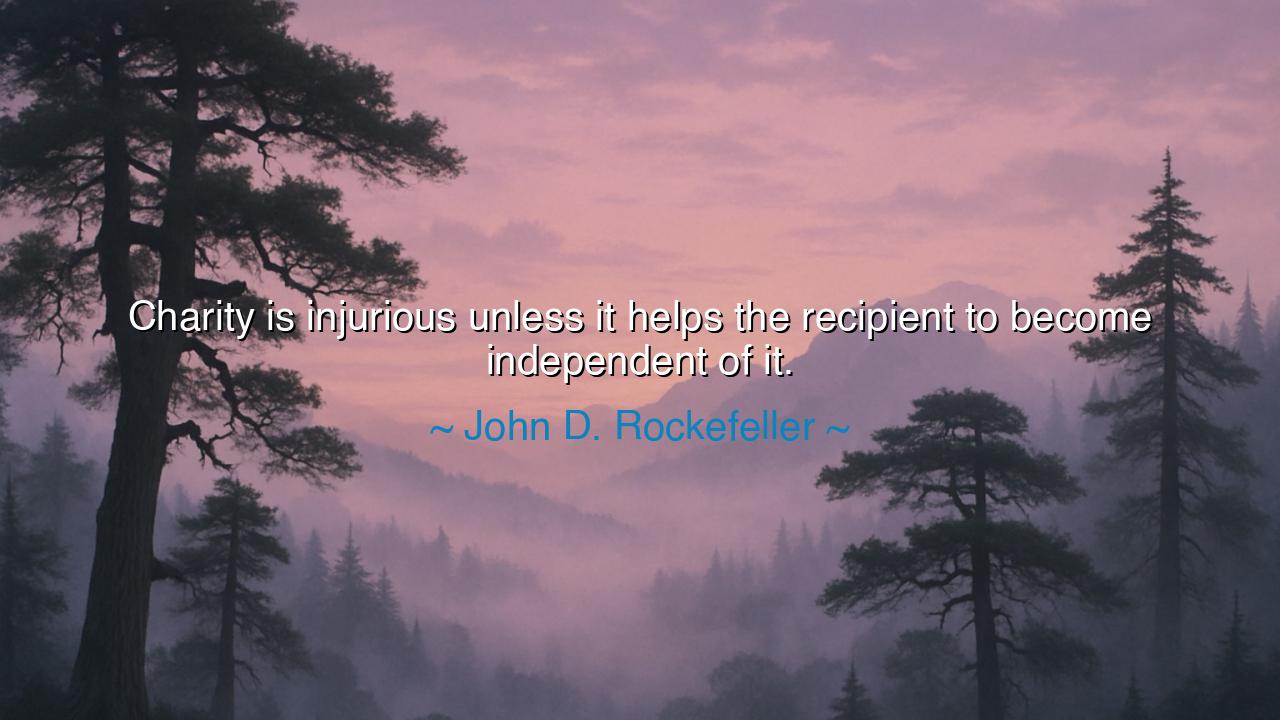
Charity is injurious unless it helps the recipient to become






Hear the wise and discerning words of John D. Rockefeller, the titan of enterprise and the father of modern philanthropy: “Charity is injurious unless it helps the recipient to become independent of it.” In this statement lies a profound law of both compassion and wisdom — that true charity does not merely soothe suffering for a day, but heals the cause of suffering for a lifetime. Rockefeller, who gave away more than half a billion dollars in his lifetime, did not speak as a man hardened by wealth, but as one who had come to understand the sacred duty of giving: to lift others not into comfort, but into independence.
The origin of this quote is rooted in the experience of a man who had seen both poverty and prosperity. Born in modest circumstances, Rockefeller began as a bookkeeper earning a few dollars a week, and through vision, discipline, and faith, he built one of the greatest fortunes in history. Yet he never forgot the sting of scarcity, nor did he lose sight of the responsibility that comes with abundance. As his wealth grew, so did his reflection: what good is generosity if it creates dependence? What value is charity if it replaces strength with weakness? Thus he came to believe that charity, in its highest form, must teach, not merely give; it must empower, not enslave. To give bread is kind; to teach one to bake is divine.
This philosophy gave rise to the foundations and institutions that still shape the world today — the Rockefeller Foundation, the University of Chicago, and countless others. He directed his fortune toward education, science, and public health, believing that the purpose of wealth was not to distribute comfort, but to cultivate capability. His approach echoed the ancient wisdom of the East and West alike: that to sustain a man’s spirit, one must awaken his self-reliance. As the proverb says, “Give a man a fish, and you feed him for a day; teach him to fish, and you feed him for a lifetime.” Rockefeller’s genius was to apply this eternal truth to modern civilization — transforming charity from a gesture of pity into an instrument of empowerment.
The ancients, too, knew the danger of unwise charity. The philosopher Aristotle, in his Ethics, warned that giving must serve virtue, not vanity — that the act of generosity should strengthen the soul of both giver and receiver. The Stoics taught that dependence, even when born from kindness, binds the spirit in chains of gratitude and shame. Consider the story of Cincinnatus, the Roman farmer who was called to save his nation in war. When victory was won, he returned to his plow rather than seek reward. The lesson is clear: greatness is born not from being sustained by others, but from standing again on one’s own feet. Rockefeller’s charity, like the wisdom of these ancients, sought not to create servants, but citizens; not debtors, but doers.
Yet there is tenderness in his teaching as well. Charity is not condemned — it is sanctified when guided by purpose. The poor, the broken, the weary — they deserve compassion. But compassion must carry wisdom in its hand. To give endlessly without direction is to drown both giver and receiver in dependency. To give with foresight — to educate, to heal, to open opportunity — is to plant the seeds of freedom. In this way, Rockefeller turned charity into a covenant between equals: the giver offering strength, the receiver offering effort, and both sharing in the dignity of progress.
Consider, then, the story of Booker T. Washington, who rose from slavery to found the Tuskegee Institute — a place where education was not mere theory, but the training of hands, hearts, and minds for independence. Washington understood, as Rockefeller did, that true liberation comes not through gifts but through growth. When Rockefeller funded Tuskegee, he was not giving charity — he was investing in human potential. Through that partnership, thousands rose from bondage into self-sufficiency, embodying the very principle that charity must lead to independence, or it fails its divine purpose.
O listener, take this wisdom as a guide for your own giving and living. When you offer help, let it awaken strength, not sleep. When you see need, let your compassion be thoughtful, not impulsive. Do not seek to be the savior of others, but their partner in independence. For every act of generosity should have a goal higher than relief — it should aim for renewal. And in your own life, accept help with gratitude, but let your spirit strive always to rise beyond it. To remain dependent is to remain unfulfilled; to become independent is to honor the gift of life itself.
Thus, let John D. Rockefeller’s words endure as a torch of wisdom for the generations: “Charity is injurious unless it helps the recipient to become independent of it.” Give not to display your virtue, but to awaken another’s. Receive not as a beggar, but as a builder. For the highest form of charity is not the gift that feeds the body, but the one that frees the soul. Let every act of kindness sow the seed of independence, and in that harvest, both giver and receiver shall find dignity — and the world itself shall rise a little closer to justice.






AAdministratorAdministrator
Welcome, honored guests. Please leave a comment, we will respond soon